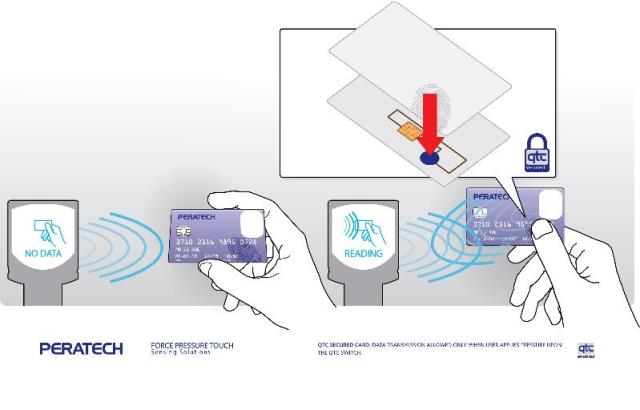Nearly five years ago, Peratech, the innovators in touch technology, warned of the possible fraud problems of data, money and identity theft from the use of RFID for Near Field Communications (NFC) in contactless access control, passports and credit cards.
Known as skimming, thieves can use easily available electronics or a smartphone to read the data on such devices without the owner even knowing that it is happening as it can be done from a distance of several feet. The problem has recently been highlighted in a report on contactless card flaws by the Newcastle University's Centre for Cybercrime and computer Security.
These contactless devices work by being waved over a reader and data is exchanged between the reader and the device. The problem comes from the fact that the devices are always on and ready to interact even when in a wallet or deep in a bag. Peratech has developed a simple, inexpensive solution that overcomes this by incorporating an ultrathin switch into the credit card or passport so that it is always off unless the owner is actually pressing the switch to activate the device for the fraction of a second needed. This ensures that the owner has full control of when the data is accessed and by whom.
 Image credits: Peratech Ltd.
Image credits: Peratech Ltd.
"We could see that NFC had this fundamental flaw," explained David Lussey, Peratech's CTO. "Unfortunately our timing was too early as most people had never heard of it but we felt it was appropriate to warn early so that the solution could be built in before such contactless devices became widespread. Unfortunately, a number of card companies are now deploying contactless credit cards without protection that can have their details skimmed and used fraudulently so we expect problems to start becoming widespread."
The secret of Peratech's solution is that the company makes a very thin, pressure-sensitive switch using its unique, multi-award winning Quantum Tunnelling Composites (QTCs) technology. This acts as an on/off switch in the circuitry of the device and is robust enough to be laminated into the credit cards as they are made. Only when the switch is deliberately squeezed by the owner will the device become active and it immediately turns off afterwards when the pressure is removed.
At only 70 microns thick, the QTC™ switch is the world's thinnest switch and is even thinner than the RFID chip in the card, enabling it to be easily embedded into a credit card, passport or access pass. QTC technology has no moving parts, requires no air gap between contacts and is robust enough to survive many years of switching on and off. Its industry-leading operational life makes it extremely reliable and suitable for integration into the thinnest electronic designs. QTC technology is being used by companies around the world, such as NASA and Nissha, for applications ranging from smartphones to automotive and from robotic finger tips to next generation touch screens.
QTC
QTC's unique properties enable it to be made into pressure sensitive switches of any shape or size. QTC switches and switch matrices can be screen printed allowing for development and integration of switches that are as thin as 15 microns. QTC is also low power and interfaces can be designed with no start resistance so that without pressure, the switch draws no power and passes no current. Importantly, when pressure is applied, the resistance drops in proportion to the amount of pressure. This enables sophisticated human machine interface designs to be created that react to variations in pressure.
The company
Founded in 1996, Peratech is a privately held company with 25 employees based in Richmond, North Yorkshire. It commercialised its QTC technology at the beginning of 2006 and is currently working with a number of key technology clients who are implementing QTC sensing technology within their own products. Its business is essentially the IP licensing model that has been proven to be rapidly scalable and highly profitable for the likes of ARM and many others.
The company is profitable, with 100% of sales being to overseas' customers making it an excellent example of British innovation bringing in global revenue. Peratech is a rare example of a university spin-in with a close working relationship with the University of Durham who are researching into the properties of Quantum Tunnelling Composites. QTC technology is protected by numerous worldwide patents and has a wide range of applications. From robotics to automotive and from touch screens to consumer electrical products, the product has sales worth millions of pounds to companies around the world. Peratech's multi-award winning QTC technology received the Queen's Award for Enterprise in Innovation in November 2012.